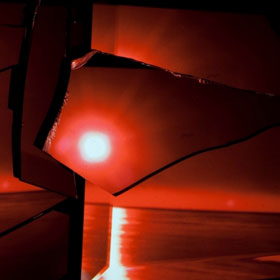Nine Types of Light by TV On The Radio

3/5
After winning the "big internet hype album" award in 2006 with Return to Cookie Mountain, and releasing what was quite possibly the most critically acclaimed album of 2008 with the "actually" great Dear Science, Brooklyn-based TV on the Radio return with their fourth studio album, Nine Types of Light. While those at least vaguely familiar with the band probably first learned of the existence of this album upon hearing its first street single, the quite excellent "Will Do," others may have experienced premonitions of its quality upon seeing its atrocious cover art, which is literally depressing to look at, or learning of its ridiculous title. Admittedly, these are cosmetic points, but it is worth considering that Nine Types of Light is in some respects one of the worst album titles of all time, mainly because it is obviously an attempt to invoke a poetic image, but by forgoing the more mellifluous word "kind" in favor of "type," it suggests a subcontractor discussing lighting fixtures with a couple redoing their kitchen.
"Second Song" begins with a speak-sung conversational rant over an arrangement of, uh… I'm not sure what the name of the instrument is but it sounds vaguely like the one used by Radiohead on "Motion Picture Soundtrack," and knowing this band, I'm going to put my money on whatever that was. It is interesting to hear a voice this lisped and nerdy on a dumb-cool post-punk revival record, a refreshing departure from vocalist and non-dancer/flailer Tunde Adebimpe standard Bowie/Peter Gabriel impression. As the band integrates guitars and a drum machine the track begins to sound a bit less like "Beyond Belief" by Elvis Costello and more like a Bee Gees/U2 song, but it works brilliantly: I can't decide if it's even sexier than their other sexy songs which are sexy and occasionally romantic; the first stretch may be the funkiest thing they've ever done.
"Keep Your Heart" loses points for rehashing a boring old chord progression and melody for its verse sequences, a lazy chorus, a forced baritone vocal that sounds sort of like a woman doing an impression of a man, and some absolutely absurd falsetto screeching, but regains them for its warm muted synth tones and wall of guitar production style. Bringing it back (slightly) is "You," a simple but effective composition making use of "weird" chord changes and yet again benefiting from a dense, detail-obsessed, synth-laden production. Lyrically speaking "No Future Shock" seems like an attempt at a novelty record but it's actually one of those album filler "bridge" tracks that's banged out at the last minute to get to the ten tracks: this doesn't make it entirely bad though, only mostly.
"Killer Crane" is, like the cover, a collage, this time of Beatles tropes: it's a bit slow in developing into anything more than this and turns out to be more like a pre-1968 George Harrison contribution so that means you'll be skipping it when it comes up on shuffle. Though it features some great drumming/programming, "New Cannonball Blues" and "Repetition" are instantly forgettable, which is really just another way of saying you might not load them onto your iPod at all. "Forgotten" may actually be one of the best songs on the album's second half even if it is completely boring and "Caffeinated Consciousness" concludes the album on a highish note with a Coldplayish chorus. The endish.
RELATED ARTICLES
Get the most-revealing celebrity conversations with the uInterview podcast!





Leave a comment